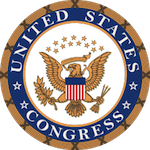 The legislative review is back after taking a month hiatus since there was nothing to report for April.
The legislative review is back after taking a month hiatus since there was nothing to report for April.
Legislation introduced in May is a bit different than others in that only one bill directly affects the section of the law that governs the U.S. Mint (Subchapter III of chapter 51 of title 31, United States Code). Let’s look at each of legislation submitted in May.
S. 1300: National Law Enforcement Museum Commemorative Coin Act
The National Law Enforcement Museum Commemorative Coin Act is a typical three-coin commemorative coin legislation ($5 gold, $1 silver, half-dollar clad) to raise money for a cause. If passed, this law will pay the surcharges to National Law Enforcement Officers Memorial Fund.
H.R. 2559: Gold Reserve Transparency Act of 2019
The Gold Reserve Transparency Act of 2019 calls for a complete assay, inventory, and audit of gold reserves held by the federal government. The proposed law requires that the location of all gold is documented “including any gold in ‘deep storage,'” the security of those places, and any transactions of that gold.
If enacted, the Comptroller General of the United States do this audit for the past 15 years and have it completed within 12 months and every five years. The law would require the complete audit to be made public with the only exception of the physical security issues.
COMMENTARY: Given the nature of the economy and a lot of other factors are the gold holds that important? The Federal Reserve reports that the M1 money supply is over $3.7 trillion and the M2 is over $14.5 trillion. Think of the M1 as cash used in commerce. The M2 represents all money, including those in savings, securities, or may have circulating restrictions. Even if the government were to account for every grain of gold as reported an in U.S. Mint’s annual reports, that would represent less than 1-percent of the M1.
Gold holdings are irrelevant to the strength of the United States economy. Maintaining the M1 supply is more critical because it is a measure of activity. Economists fear wild tariffs since it will have a direct effect on the M1 money supply. Changes to the M1 will alter the demand for the products produced by the U.S. Mint and Bureau of Engraving and Printing.
H.R. 2558: To define the dollar as a fixed weight of gold.
H.R. 2558 would require the Secretary of the Treasury “define the dollar in terms of a fixed weight of gold, based on that day’s closing market price of gold” and allow Federal Reserve Notes to be exchangeable for gold at that statutory rate.
COMMENTARY: This is a backhanded attempt to return the United States to the gold standard without the sufficient backing of gold that will support this effort. With the money supply being over $14 trillion, trying to match the amount of gold at market value to every U.S. dollar would cause a devaluation of the currency that it would not be economically viable to do business in or with the United States.
Further, the market price of gold is set by private banks, metals dealers, mining companies, and other financial companies from all over the world through the London Bullion Market Association (LBMA). Given the makeup of their membership, this bill will allow this market that includes people from Bahrain, China, Switzerland, Russia, and other countries where the United States may have disputes to have direct influence over the strength of the U.S. dollar.
The introduction of a bill like this makes for good talking points for a constituency that is ignorant of the ramifications of this law. It is not sound policy given the nature of the markets.
H.R. 2630: Cash Always Should be Honored Act
The Cash Always Should be Honored (CASH) Act states that “It shall be unlawful for any physical retail establishment to refuse to accept legal tender as payment for any products or services offered for sale by such physical retail establishment.” The bill allows exemptions for online and telephone-based transactions.
COMMENTARY: Although I believe in the power of spending the products of the U.S. Mint and Bureau of Engraving and Printing over using electronic means, it should not be the government’s place to tell anyone how to conduct business.
Another short-sighted bill that does not consider the modern economy because it does not consider changes to the concept of a physical retail establishment. For example, what about mobile-based commerce? Would the rideshare companies be required to take cash? What about the plumber who comes to fix your sink? What about the food truck where you might buy lunch?
For the numismatists, how would this affect dealers at a coin show? Will you be required to carry around a wad of currency to buy coins? Would there be a distinction between the dealer who only sells at shows versus a dealer with a shop who travels to shows?
It is another bill that looks better as part of talking points than its effects on the real economy.
H.R. 2650: Payment Choice Act of 2019
This Payment Choice Act of 2019 is similar to the CASH Act in that it will prohibit any business from refusing “to accept United States legal tender of cash as payment for goods or services,” post signs saying that the establishment will not accept cash, or charge a higher price for paying in cash. The bill exempts “any goods or services sold to the public by telephone, mail, or internet.”
COMMENTARY: See the commentary for the CASH Act, above.

